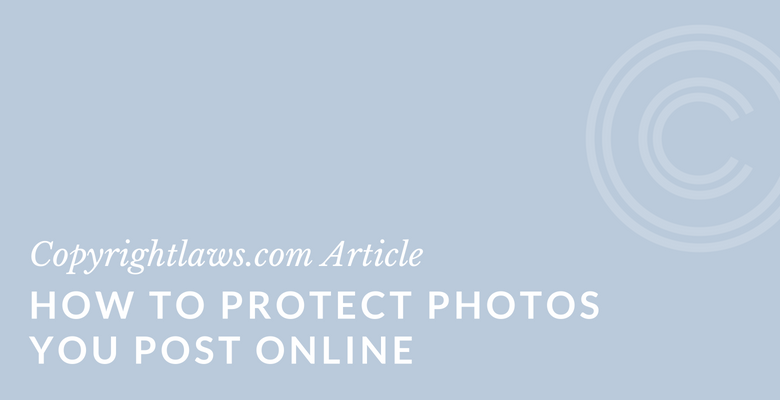
How to protect photos you post online may be both simpler and more difficult than you realize.
Are you one of those people snapping photos all the time with your phone, or perhaps a camera or tablet? Although you may think your images are amateur and simply family or travel images, you still have rights in them. You may even take a fabulous picture that you enter into a photo contest or license to your community magazine or newsletter. Then the issue of copyright may be even more important to you.
Copyright protection is automatic in the U.S. and in an additional 180 countries around the world (see details below). This protection gives you the right to control who uses those photographs. Below is a primer on how to protect photos you post online, whether you're a professional or amateur photographer.
Copyright Protection in Images Is Automatic
Did you know that your copyright protection begins the moment you take a photo? That's how copyright law works in the 181 countries around the world that are members of the Berne Convention. It makes no difference whether you take that photo with your smartphone, iPad or SLR camera.
Once you save the photograph (or fix it, as copyright parlance calls it) on your phone, a memory card or otherwise, it’s automatically protected by copyright in the U.S. and in other Berne member countries.
You don’t have to do anything to secure copyright protection. For instance, you don’t need to place the copyright symbol, ©, on the image or register it with the U.S. Copyright Office (USCO). However, doing both these things will make it easier to enforce your rights and you'll have greater remedies for unauthorized uses under the U.S. Copyright Act.
How To Protect Photos You Post Online
If you’re emailing your photos to your aunt or college roommate, you likely don’t need to register the images or even place the copyright symbol on them. However, if you’re selling your photos online or placing them on your blog or on any social media, there are proactive steps you should likely take. A good general rule to determine those proactive copyright steps is to first decide whether you would actually enforce your rights against any unauthorized uses. If you would, then read on!
Keep in mind that when it comes to copyright protection, there are no failsafe methods of ensuring that only those who have your permission will reproduce your images. However, there are easy things you can do, whether you're a professional or amateur photographer, to protect your online photos, monitor uses and take action against any unauthorized uses.
Use the Copyright Symbol
One of the simplest ways — and it's also free — to protect your photos is to place a copyright symbol, ©, and notice on them.
Using a copyright symbol may be important if you’re sharing your photos online in public forums, whether on your own website or blog, a site where you sell your photographs or photography services, or posting images on social media such as Instagram or Flickr.
Many people mistakenly think that anything found online and on social media is free for the taking. The copyright symbol gently educates your social media followers that this isn’t true. The copyright notice reminds people that copyright exists in your images and states the copyright owner’s name (you!).
Also, always include a copyright link or dedicated page on your blog where you discuss copyright protection in your images, and provide your email address with a clickable link so readers have a quick and easy way to contact you for permission before using your images.
The Copyright Notice
There are three elements which should be present in a copyright notice:
- The “c” in a circle, ©, or the abbreviation “Copr.” or the word “Copyright”
- The name of the copyright owner
- The year of first publication
These elements need not necessarily appear in this sequence. Here are some examples:
- © Simon Soffit 2022
- Copyright © Simon Soffit 2022
- © 2022 Simon Soffit
Read more about the copyright symbol and which notice year to use.
Register Your Images With the U.S. Copyright Office
Although registering your images with the USCO isn’t required for copyright protection, there are several advantages to doing so. These include:
- Registration within five years of the image's publication provides prima facie evidence of your copyright claim.
- Registration is required before you can file any copyright infringement action in court for works of U.S. origin.
- If you register your images prior to an infringement action or within three months after publication of the work, as copyright owner you have the ability to seek special statutory damages and lawyers’ fees. Without registration, only an award of actual damages and loss of profits is available and these may be difficult to prove.
You may register with the USCO at any time following creation of your photographs, even years later. The sooner the better, though, so you have proof of the earliest date possible as a record in the USCO for the presumption of copyright in those images in your name. For further information on registering photos with the USCO, see their copyright registration and photographs page.
If you live outside the U.S., you can still register your images with the U.S. Copyright Office. This registration can provide you with proof that could also assist you in a copyright infringement suit. You may also want to investigate any voluntary registration your own country's copyright act provides and determine if that voluntary registration provides any advantages that make registration there worthwhile.
When Is Registration Valid?
A March 2019 U.S. Supreme Court case ruled on when registration becomes effective for purposes of instituting a copyright infringement suit. In Fourth Estate v. Wall-Street.com, the court examined when "registration ... has been made" under the U.S. Copyright Act (section 411). The Supreme Court ruled that a copyright registration application must be approved or denied by the USCO before a copyright owner can file a copyright infringement suit.
This means that photographers and other creators who may be likely to enforce their rights need to register their images and other works as soon as possible following creation of the works. Note that the USCO offers expedited registration but at a much higher registration fee.
Should I Use a Creative Commons License?
A Creative Commons (CC) license allows copyright holders to permit others to use their works in the manner specified in the CC license they've chosen. The Creative Commons site states:
Our tools give everyone from individual creators to large companies and institutions a simple, standardized way to grant copyright permissions to their creative work. The combination of our tools and our users is a vast and growing digital commons, a pool of content that can be copied, distributed, edited, remixed, and built upon, all within the boundaries of copyright law.
You choose the terms and conditions of use from among the various CC licenses. Then anyone may use your images according to the terms of that license. For use beyond the license, they must contact you for permission.
Note that CC licenses are only available for works protected by copyright and do not apply to works in the public domain.
Are CC licenses confusing to you? Learn about the various CC licenses, and how to pick the right one for your online photos at Creative Commons Licenses: How to Choose the Best CC License.
Be Proactive
Protecting the photos you post online also involves monitoring the use of your protected images. This is an important aspect of ensuring only authorized uses of your photos.
Conduct Google (or other search engine) searches for your images on a regular basis, maybe once a month, so you can monitor for inappropriate use.
If you find any sites using your images without your permission, email to advise them their use is unauthorized. Ask for the remedy you wish to occur. Examples of remedies could include:
- Taking down the photo
- Giving you credit and a link back to your blog
- Payment for past and future use
Follow up with a lawyer if need be.
Take the Time to Understand Copyright
Summary points:
- Whether you're a beginner or expert photographer, amateur or professional, your photographs are automatically protected by copyright.
- Learn about your rights and how to protect photos you post online.
- First steps include placing a copyright symbol on your photos, using a CC license, and considering registering your photos with the USCO.
- See our Digital Copyright Questions and Answers.
Learn more about copyright law with our online copyright eTutorials.



